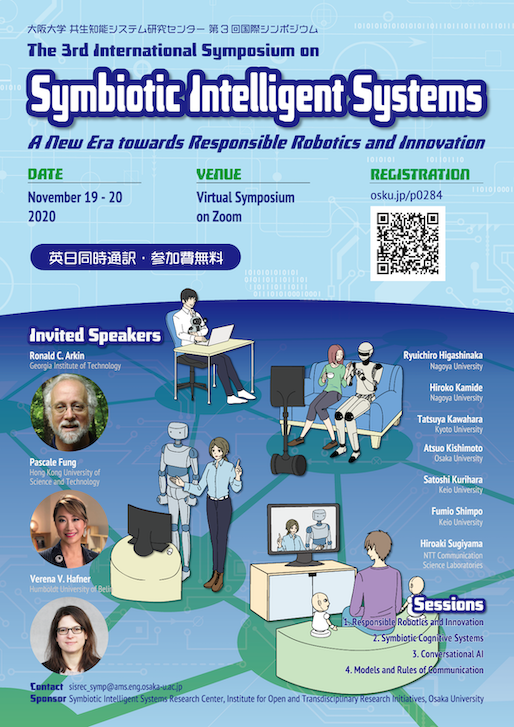We would like to invite you to submit your articles to Interaction Studies Special Issue on Ethics, Law, and Psychology towards Responsible Robotics for the Society.
Please see here for more details.
Interaction Studies
Special Issue on “How will Autonomous Robots and Systems Influence the Society? Debate from technological, philosophical, ethical, legal, and social implications perspectives”
Co-Guest Editors: Minoru Asada, Raja Chatila, Tatsuhiko Inatani, Phillip Morgan, and Yuji Kawai
Submission Deadline: December 1st, 2020
Acceptance/rejection notification: June 1st, 2021
Publication: October 1st, 2021
Recent rapid progresses of autonomous robots and AI have been changing our lives not simply with higher capabilities in many functions, but rather in ways of interactions between humans and machines. In such situations, the meaning of autonomy in artificial systems may cause over-expectation or sometimes misunderstanding for robots’ capabilities. It’s time to reconsider the meaning of “autonomy” in artificial systems from not only technological aspect, but from more broader perspectives such as moral, ethical, legal and social ones. The aim of this special issue is to share and discuss the potential issues of the current and future autonomous robots and systems. Fundamental questions are:
- To what extent does increasing machine autonomy affect morality and ethics?
- What’s a new relationship between humans and advanced robots and AI systems?
- How will moral and ethical issues change to adapt with these technical advancements?
- Can the current legal systems handle the accidents caused by human-machine interactions?
- What are social risks in a symbiotic society with them?
- How do we optimise human-centred cyber security of autonomous robots and human-machine systems?
Further, we are thinking about the design for AI and autonomous systems with human capabilities (such as abstract thinking and adaptability) and beliefs (such as trust and acceptability). Because the issues are so broad, we will call for papers to fill the gap and to enrich the discussions.
The interest topics of the special issue include, but are not limited to:
- Autonomy
- AI systems
- Symbiotic society
- Morality
- Ethics
- Legal system
- Social interaction
- Trust
- Responsibility
- Reasoning
- Adaptability
- Human-machine interaction
- Acceptability
- Cyber security
- Liability
- Accountability
- Responsible/Ethical Design


